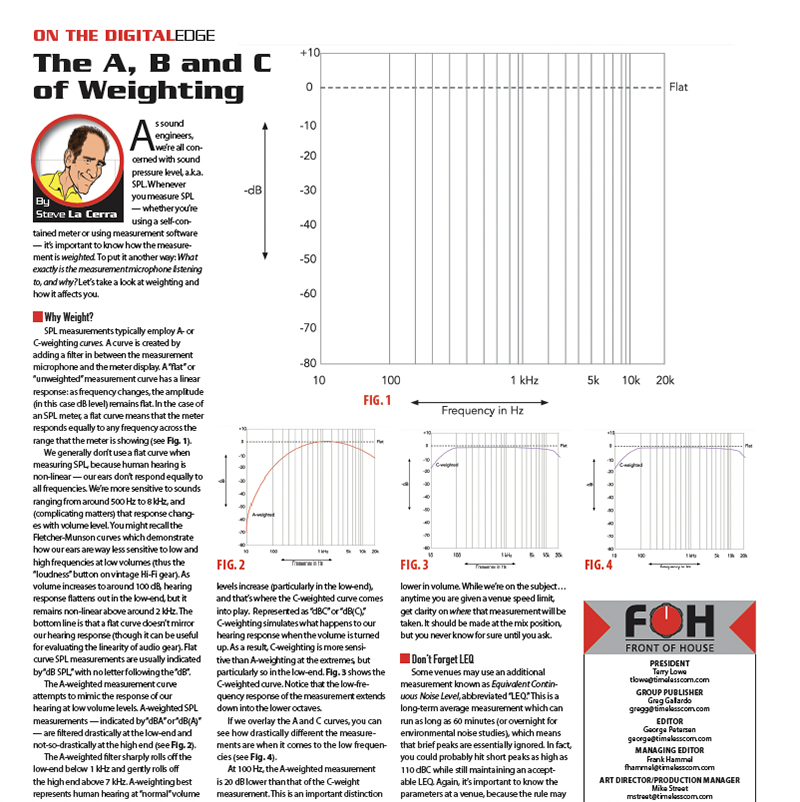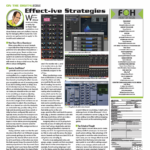On Jan. 15, the FCC came down from the mountain with a stone tablet upon which was scribed "anyone who uses a wireless microphone (or similar device) that operates in the 700 MHz Band will have to stop operating their wireless microphone (or similar device) no later than June 12, 2010."
When the FCC says "similar devices," what they are referring to are wireless instruments, in-ear monitoring and intercom systems. In other words, the pro audio industry has been screwed. To read the entire gory story, check out this link: http://www.fcc.gov/cgb/wirelessmicrophones.
696 to 806 MHz Off Limits
For those of you who weren't paying attention, the FCC has reallocated the frequency range from 696 to 806 MHz. Some of it was set aside for new public safety channels, and a large portion of it was auctioned off to cellular communications companies such as Verizon and ATT who want the bandwidth for broadband delivery to ‘smart phones' and similar devices. Where does this leave pro audio? We need to make some rather uncomfortable adjustments.
Item 1: We (pro audio) have been ordered to vacate the 700 MHz band. This means that any wireless gear that you own, operating in the region between 696 and 806 MHz, is illegal to use after June 12, regardless of whether or not you have secured a license. After that date, it's not okay to use this gear, because you will be unlawfully occupying someone else's space. In fact, you may experience interference issues in that range right now, because testing of new services has already started. The FCC takes this very seriously, and so do the service providers who purchased the space. I have heard reports that one provider is traveling through busy areas with scanning equipment, tracking down violators, and sending cease and desist orders.
Item 2: Even if you decide to break the law, you'll have to deal with "white space" devices interfering with your wireless audio. At best, you'll get a dropout here or there, but imagine this scenario: your production manager decides not to replace the gear from last year's tour. You take it on the road, and one night in, say, New York or Los Angeles, your star's wireless ear system picks up a cell phone call in the middle of a show (Spinal Tap anyone?). Oh, you're going to have an awesome conversation in the star's dressing room after the show. Not only do you get to go home for Christmas, but you'll be home in time for the first day of spring too. You must inform your clients that they may need new wireless gear. If they don't go for it, then make it clear you take no responsibility for mishaps.
Item 3: What do you do with your 700 MHz gear? Grrrr. This is very uncomfortable. Some RF manufacturers offer trade-in rebates on 700 MHz systems, facilitating a path to compliant gear. This is a very gracious gesture to help alleviate the fact that the FCC has screwed you, but don't expect a 50 percent discount. The FCC Web site suggests you "remember to recycle any electronic equipment you are discarding. Recycling electronic equipment recovers valuable materials from the circuit boards, metal wiring, leaded glass, and plastics." Oh, I can recycle that $1,200 wireless system that is now obsolete. That makes me feel so much better.
Item 3-A: Be kind to small animals and those less fortunate than you. Having 700 MHz gear is akin to having a lifetime supply of blank Betamax tapes. What the heck do you do with them? Oh, now I can see the light bulbs going off, and there's a storm brewing. In this corner: Pro audio geeks telling their friends not to purchase any RF gear via Ebay just because it looks like a great deal. "A $1,200 wireless mic for $150? It's a steal!!!" Yeah, but it's a 700 MHz system, and it's illegal to use. Tell your friends.
In the other corner: Darth Fader, ready to dump his 700 MHz gear on Ebay to unsuspecting musicians who don't know better. They buy it and find out in three months that it's useless. Don't go there. It's unethical and it's bad karma. This is why unscrupulous audio guys get electrocuted on outdoor gigs.
Item 4: There are life-safety issues in play here. It's conceivable that your operation of a 700 MHz RF system could interfere with communication between firefighters or police. Are you willing to risk interfering with public safety? I hope not. It's dangerous, and if the FCC finds out that you are doing so, they're going to kick your ass (my interpretation). Looking at it from another angle, there are multimedia shows (some in Vegas come to mind) where wireless systems are used for show control. What if that includes remote control for a chain hoist? Maybe a hoist that lifts an acrobat during a certain part of the show? If that communication takes a poop, the best-case scenario is that the show stops. I don't want to think about the worst-case scenario.
Wha'Cha Gonna Do?
If you still own wireless gear in the 700 MHz range, you have some difficult decisions. Economic times are tough, and no one wants to mothball perfectly good gear. You can continue to use 700 MHz systems after June 12, but at what cost? Maybe if you are in a rural area you can get away with it for a while at the risk of occasional interference. If you are in a metro area, you won't be so lucky. You'll be interfered with, and you'll be interfering with someone else.
Of course, there are always alternatives. Manufacturers have already marketed systems for less-crowded RF bands (for example the 900 MHz range) and are using refined technology to operate systems in the shrinking bandwidth that is – at the moment – deemed legal for pro audio (470 to 698 MHz). One thing is certain: on June 13, you'd better think carefully before you fire up that rack of wireless mics.



